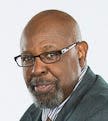UF researcher's project among efforts to improve mental health among African Americans
Among African Americans, it’s often said that when "white America gets a cold, Black America catches pneumonia." Just look at the disproportionately high COVID-19 infection and death rates among African Americans, if there is any doubt. Or look back at how the wealth gap between Blacks and whites widened because of the Great Recession.
Now with more public attention being given to the benefits of mental health wellness in the overall population, it’s become clearer that mental illness among African Americans should be added to the list of gross disparities between Blacks and whites. A few indicators of this predicament include disproportionately high rates of crime and domestic violence.
Too, there’s the added stress caused by racism and discrimination. I thought of this recently when a Facebook friend sought social media advice after having second thoughts about following through on a contract to purchase property in a rural North Carolina community.
More from James F. Lawrence:
Gun violence of all kinds needs attention, new solutions at White House summit
Adequately fund public education, but also provide help for struggling families
I feared staying at a white friend's house, due to suspicions faced by Black men like me
He’d learned that the community, located less than an hour from a major metropolitan area, was 99% White and was once a haven for the Ku Klux Klan. See the stress and angst he faced in deciding whether to move forward on the contract?
Now consider this overall factoid about Blacks and therapy: A National Healthcare Disparities Report found that despite high levels of stress, anger and other contributors to mental health episodes, only 54.3% of adult Black Americans with a major problem received treatment in 2011 compared with 73.1% of white Americans.
Fortunately, there are signs that this problem, aggravated in recent years by the COVID pandemic, is starting to be addressed more aggressively. Social media, for instance, has swelled with advertisements for tele-therapy sessions. And it’s no longer unusual for everyday people to talk openly about undergoing therapy.

In Gainesville, credit the efforts of Dr. Carolyn Tucker, a University of Florida professor of psychology and professor of community health and family medicine. Amid a rapidly changing culture in which the stigma associated with mental health therapy is becoming less pervasive, Tucker has launched a research project designed specifically to reduce stress, depression, grief and anger among African Americans living in east Gainesville.
“As a clinical psychologist, I see many Black people struggling with stress and feelings of isolation,’’ Tucker said. “They often want therapists who look like them.”
Tucker's project meets the rising need. It involves recruitment of Black adults and youths as coaches and participants in supervised virtual mental health coaching and counseling sessions. Coaches will lead peer support groups designed to improve mental health and well-being in the Black community. To learn more, call 352-294-0652.
While Tucker’s project is the only one of its kind in the nation, it isn’t necessarily unique. In fact, it is based on the once routinely practiced Black community tradition of its leaders and institutions working together as problem solvers.
“We’re empowering communities to take care of their mental health,” Tucker said. “We’re creating an infrastructure of community members who can work with others.”
Data collected before and after the project will be used to determine the best methods of managing stress in the Black community. Identification of best practices can lead to overall improvements in such serious health disparities as heart disease, stroke, hypertension, cancer and obesity.

The data also can be used to heighten awareness among health professionals of the need for diverse staff whose presence can make it easier for patients of color to decide whether to seek treatment for both mental and physical illnesses.
James F. Lawrence is executive director of Gainesville for All. Send inquiries to gnv4all@gmail.com.
Join the conversation
Letters to the editor present the opinions of readers on news stories and other pieces published by The Sun. Share your opinions by sending a letter to the editor (up to 200 words) to letters@gainesville.com. Letters must include the writer's full name and city of residence. Additional guidelines for submitting letters and longer guest columns can be found at bit.ly/sunopinionguidelines.
Journalism matters. Your support matters.
Get a digital subscription to the Gainesville Sun. Includes must-see content on Gainesville.com and Gatorsports.com, breaking news and updates on all your devices, and access to the eEdition. Visit www.gainesville.com/subscribenow to sign up.
This article originally appeared on The Gainesville Sun: James F. Lawrence: Improving mental health among African Americans

